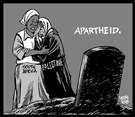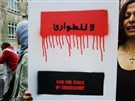Making my way back to Ireland from the Third World Approaches to International Law conference at the University of Oregon last week, I found myself with a few hours to kill between flights in New York. In the basement of a second-hand bookshop, I picked up a dusty old copy of the Selected Writings of Bertrand Russell. After paying a visit to Occupy Wall Street, I caught a bus back to the airport, where the words of Russell’s introduction, written on the cusp of the great depression in the late 1920s, jumped out: “It is evident that, in a world where there was leisure and economic security for all, the happiness of all would be greater than that of ninety-nine per cent of the present inhabitants of the planet. Why, then, do the ninety-nine per cent not combine to overcome the resistance of the privileged one per cent?”
While I hadn’t come across reference to this in the messages and statements of the “Occupy” movements, upon reading it I assumed Russell’s call to action must have provided inspiration for the 1% versus 99% dichotomy in the slogans. A limited internet search has since failed to confirm this, and it appears that Russell’s prophetic words were simply that: prophetic.
Welshman Bertrand Russell is hailed as one of the twentieth century’s greatest philosophers, and as the finest logician since Aristotle. On top of groundbreaking achievements in mathematics, analytic philosophy and logic, he was a prominent social critic and won the Nobel Prize in Literature for writings that championed humanitarian ideals and freedom of thought. He was convicted under wartime emergency legislation in Britain and imprisoned during the First World War for engaging in pacifist activities. Decades later, at the age of 89, he served another sentence for incitement to civil disobedience in the context of the anti-nuclear weapons movement.
The Russell Tribunal on Palestine, whose third session convenes in Cape Town this week, follows in the footsteps of its namesake on Vietnam, established by Russell himself in 1966 with the support of Jean-Paul Sartre and others. The Russell Tribunal, or the International War Crimes Tribunal, was established in response to what its founder described as “the crime of silence” over war crimes in Vietnam. At the opening of the Tribunal, Russell declared: “We are not judges. We are witnesses. Our task is to make mankind bear witness to these terrible crimes and to unite humanity on the side of justice in Vietnam.” The Tribunal is credited with raising public awareness considerably as to reality on the battlefield at that stage of the war. It was followed by a second Russell Tribunal on Latin America in the 1970s that dealt with the military regimes in Brazil and Chile, and spawned numerous offshoot peoples’ tribunals covering conflicts from El Salvador to Eritrea, as well as the Armenian genocide.
This next installment of the Russell Tribunal on Palestine is charged with ascertaining whether Israel’s rule over the Palestinian people violates the prohibition of apartheid contained in international law (defined as "inhuman acts committed for the purpose of establishing and maintaining domination by one racial group of persons over any other racial group of persons and systematically oppressing them"). Those who consider it a step too far to be adjudicating whether the democracy on which Israel prides itself may legally be defined as a regime of racial domination are reminded of one of Bertrand Russell’s own ten commandments: “Do not fear to be eccentric in opinion, for every opinion now accepted was once eccentric.” It must be remembered that, while popular international mobilization against apartheid in South Africa had steadily gathered momentum through the 1960s and 1970s, as late as 1988 the US and British governments vetoed a draft Security Council resolution for selective mandatory sanctions against South Africa’s apartheid regime, instead opting to designate the African National Congress as a foreign terrorist organisation. Both Ronald Reagan and Margaret Thatcher personally denounced Nelson Mandela, who would not be removed from Washington`s terrorist watch list until 2008.
Russell himself, by contrast, had a foresight and vision that allowed him to see through the façade of negotiations and the reality of the power structures in their formative stages in the Israeli-Palestinian setting. He died in 1970. One of his final acts, at the age of 97 and only two days before passing away, was to issue a forceful statement to an international conference of parliamentarians in Cairo, condemning Israel’s proliferating regime of conquest:
The development of the crisis in the Middle East is both dangerous and instructive. For over 20 years Israel has expanded by force of arms. After every stage in this expansion Israel has appealed to “reason” and has suggested “negotiations”. This is the traditional role of the imperial power, because it wishes to consolidate with the least difficulty what it has already taken by violence. Every new conquest becomes the new basis of the proposed negotiation from strength, which ignores the injustice of the previous aggression. The aggression committed by Israel must be condemned, not only because no state has the right to annexe foreign territory, but because every expansion is an experiment to discover how much more aggression the world will tolerate. […] Not only does Israel condemn a vast number of refugees to misery; not only are many Arabs under occupation condemned to military rule; but also Israel condemns the Arab nations only recently emerging from colonial status, to continued impoverishment as military demands take precedence over national development.
With Israel`s colonizing expansion in the West Bank now being expedited in response to Palestine`s admission to the United Nations Educational, Scientific and Cultural Organization, Russell`s analysis remains as pertinent as ever.
In the struggle for equality and dignity in Palestine and, although perhaps unbeknownst to them, in the endeavors of the “Occupy” movements around the world, Bertrand Russell’s legacy lives on.
![[Bertrand Russell. Image from unknown archive.]](https://kms.jadaliyya.com/Images/357x383xo/BertrandRussell.jpg)





